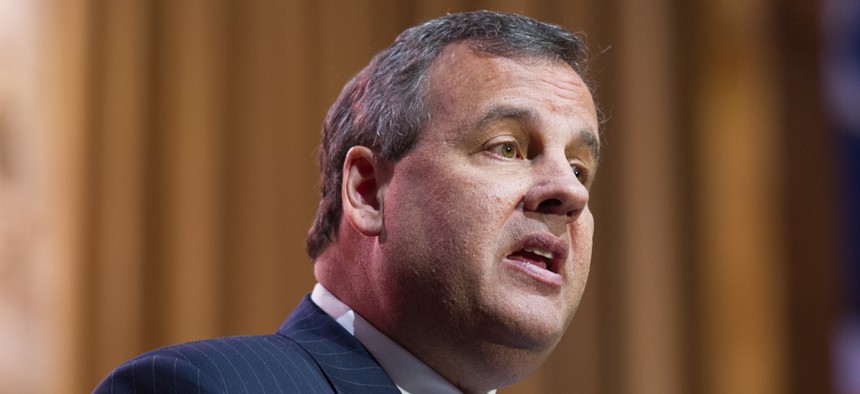
Christopher Halloran / Shutterstock.com file photo
Chris Christie: Edward Snowden Is a Criminal and NSA Fears Are 'Baloney'
The Republican governor and likely White House hopeful will accuse Hollywood and “civil-liberties extremists” of hijacking the NSA debate in a speech Monday.
New Jersey Gov. Chris Christie will condemn Edward Snowden as a "criminal" and charge civil libertarians with drumming up "baloney" concerns about the National Security Agency's spying practices Monday during a foreign policy speech to be delivered in New Hampshire.
"Too often, the loudest voices in the debate about how to keep our country safe are driven by some purist, theoretical vision of how we should manage our intelligence efforts," the Republican and likely White House contender will say, according to excerpts provided of his prepared remarks. "Let me be clear—all these fears are baloney."
Christie, whose remarks come as Congress is weighing reforms to the NSA, will denounce such efforts as illegitimately hyped by Snowden, Hollywood, and civil-libertarian "extremists."
"When it comes to fighting terrorism, our government is not the enemy," Christie will say. "And we shouldn't listen to people like Edward Snowden, a criminal who hurt our country and now enjoys the hospitality of [Russian] President [Vladimir] Putin—while sending us messages about the dangers of authoritarian government. And, frankly, we don't need advice from Hollywood, the guys who made our intelligence agencies the villains in practically every movie from the last 25 years."
Christie has sternly admonished NSA critics before, telling them they should sit down with the families of the victims of the September 11, 2001, terrorist attacks before questioning the importance and legitimacy of the nation's surveillance programs. His stance on mass surveillance aligns him other GOP defense hawks running for president, including Sen. Marco Rubio, who has launched a campaign, and former Florida Gov. Jeb Bush, who is expected to officially declare in the coming weeks.
But Christie's Monday remarks are his most extensive yet regarding the NSA and come as he nears a decision on whether to formally enter the Republican field for president. Christie has said he will make an official announcement regarding his White House plans in May or June.
The speech also arrives as Congress is nearing a June 1 deadline to renew three of the Patriot Act's surveillance provisions, including Section 215, which the NSA uses to justify its bulk collection of U.S. call records. Last week, the House overwhelmingly passed a reform package, the USA Freedom Act, that would effectively end the American phone-records dragnet, but it remains unclear if Senate Majority Leader Mitch McConnell will allow any reforms through the Senate.
Christie's speech makes clear his view—shared by Rubio, Graham, and Bush—that reforms to pull back the NSA's powers are unnecessary and short-sighted. It puts him directly at odds with Republican Sens. Rand Paul and Ted Cruz, however, both of whom are running for president and believe the NSA has overstepped its authority and needs to be significantly pared down.
Christie's speech takes particular aim at Snowden, a former NSA contractor whose leaks that began nearly two years ago have exposed many of the agency's once-secret surveillance programs. Snowden is currently living in Moscow under asylum. His June 2013 rendezvous in Hong Kong with journalist Glenn Greenwald was chronicled last year in film-maker Laura Poitras's Oscar-winning documentary, Citizenfour.
"When Edward Snowden revealed our intelligence secrets to the world in 2013, civil-liberties extremists seized that moment to advance their own narrow agenda," Christie will say. "They want you to think that there's a government spook listening in every time you pick up the phone or Skype with your grandkids. They want you to think of our intelligence community as the bad guys, straight out of The Bourne Identity or a Hollywood thriller. And they want you to think that if we weakened our capabilities, the rest of the world would love us more."
Christie's speech will also discuss the need for a "stronger national defense strategy," and the importance of bolstering existing alliances and forging new ones, according to his prepared remarks.
(Image via Christopher Halloran / Shutterstock.com )
NEXT STORY: Pope Francis' Nine Rules for Happy Living







